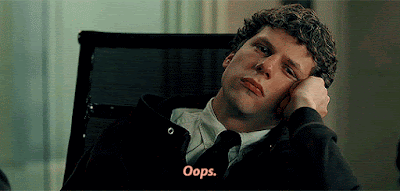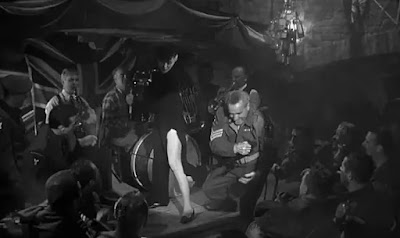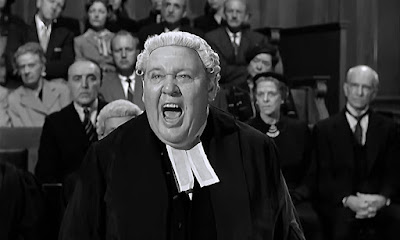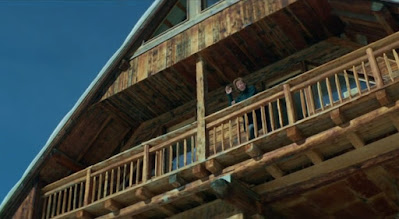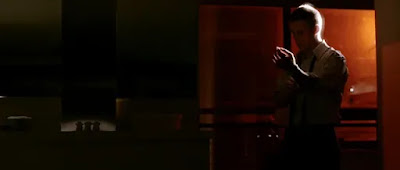or
Juris-Imprudence (So, Help Us, God)
If I recall (having seen every episode) Clint Eastwood never appeared on the old "Perry Mason" TV show—one of the few elder statesmen-actors still working not to do so (and he was working for that show's network at the time). He seems to be making up for that with Juror #2, a courtroom drama with enough twists and turns to make Perry trip while hulking out of his chair at the defense table (come to think of it they rarely had juries on the "Mason" show—budget, you know).
James Michael Sythe (Gabriel Basso) is being tried for the brutal murder of his girlfriend, Kendall (Francesca Eastwood). They'd been seen fighting at a local watering-hole on a dark-and-stormy night and the politically-inclined District Attorney (Toni Collette) makes the case that Sythe was seen following after the victim as she was walking home in the torrential down-pour. Her body was found the next morning in a culvert under a bridge dead from blunt-force trauma. His attorney (Chris Messina) argues nobody saw the murder (even if a lot of people saw the fight at the bar). No murder weapon was found and Sythe maintains his innocence. One of the jurors, a retired copy (J.K. Simmons), says "He shoulda took the plea deal." But, one guy on the jury, Justin Kemp (Nicholas Hoult), expectant father and reluctant jurist, isn't so sure. Once on the jury and hearing the details of the case, he starts having flash-backs of a night a year ago, when he was at the same bar the night that argument happened, but his wife had just lost twins, and he was thinking of having a drink, despite being in AA for four years sober. He remembers driving down the same road where the girl was killed and, distracted by his phone, took his eyes off the road and he hit something. Hit something hard. But, getting out of his car and looking around, he saw nothing, and, supposing he'd hit a deer and it ran off, he got back in his car and drove home.Now, sitting in court, hearing the particulars, he's not so sure. Maybe it was this girl, Kendall, that he hit with his car. Day after day he sits in the courtroom hearing testimony from investigators and expert witnesses all leading to the suspicion that it was Sythe who did it deliberately. The trouble is: nobody saw him do it. It's all circumstantial and speculation. And the more Kemp hears, the more he thinks he might be the guilty party and the guy he's going to sit in judgment of is innocent.What would you do, dear reader? I'd like to think that you'd do the right thing and turn yourself in and let an innocent man go free. But, my reading of "the times" (and the lack of civics classes in public education) tells me that nobody admits to doing anything wrong if nobody knows about it. Let sleeping dogs lie. Nobody's getting hurt. It wasn't my fault. I needed the money. I had a rotten childhood. In today's environment, George Washington would have hid the axe. Honesty's for suckers and losers. Kemp's excuse is he has a family with a baby due any minute, he can't do that to them.
But, what about Kendall? Her aggrieved family? What about the schlub who's being railroaded by the cops and the judicial system and may go to prison for life for something he didn't do? Is that justice? Kemp goes to his AA sponsor—a lawyer (Kiefer Sutherland)—who tells him vehicular man-slaugher will get him 30 years to life if he admits what he did, but maybe, just maybe, the jury will find the guy innocent and the problem will just...go away. And when closing arguments are over and the case goes to the jury, it is near-unanimous that Sythe should go to prison—except for one juror, Kemp. And he begins a methodical, near desperate process to convince the fellow jurists that Sythe is not guilty...within a reasonable doubt. And he's the perfect man for the job...as he may be the guilty party.
It sounds like an upside-down version of 12 Angry Men—the television-play and movie where one jury-member tries to convince his determined fellow jurists that the person they're supposed to judge is not guilty (and for a while it goes down that path)—but, there are complications and points of jurisprudence that threaten to up-end the entire trial. But, what none of the members of the court see is that they've got the wrong guy (sure, they've got the most likely guy), but what they don't see is the responsible party is right under their noses, and he is completely irresponsible to do what is expected of him—to do the right thing. Justice really is blind here, as Eastwood keeps visually reinforcing again and again and again.It's a different movie, one that Eastwood's fans might not cotton to as it features nobody to root for, and the protagonist is dishonest, vulnerable, self-interested and...the worst sin of all, has self-doubts. Usually in Eastwood's film of choice, they're stalwart in the face of implacable enemies and chart a straight course towards what is a resolution or usually revenge. Sure, there have been vulnerable Eastwood protagonists, flawed Eastwood protagonists, even Clint veered off the straight and narrow in things like Bronco Billy and Tightrope. But, to have self-doubt come into play, I think you'd have to go all the way back to...Breezy. And not only self-doubt. In another age, at another time, one could see Kemp as a villain, a slightly sociopathic one with a narcissistic tunnel-vision that prevents him from seeing anything beyond his own situation. He's at least a coward, and a selfish one at that. Let another man rot in jail for something he did? What a lying skank.But, that, the movie is saying is the point. At one point, the judge in the case tells the jurors "this process, as flawed as it is, is still the best way of finding justice." But, is it? In a world of people of good faith and strength of character, it very well may be. But, it is dependent on honesty and the penalty of the law. If everybody is lying on the stand, without the fear of perjuring themselves, the system ("flawed as it is") is worthless. Anybody not doing their job rightly, be they police, lawyers, judges, or witnesses threatens to derail any pretense of achieving "justice." And in a worthless system, where justice may actually be derailed, everybody is at risk. You only have to look at the work of the Innocence Project to see the results of a process that doesn't care about truth or innocence but only in the "feeling" that it's good enough or to make things seem done (hence the dependency on plea-deals). People fall through the cracks in such a system and then become lost in it. And some die in it. You can't seek to rid Society of corruption with a means that, in itself, is corrupt.
Eastwood hasn't done anything like this before—although Mystic River comes close—basing his movie around "the bad guy" (if we want to be simplistic about it), however self-serving the character's rationalizations for doing so. And he's aided immeasurable by the one thing Eastwood has always excelled at: casting. Everybody in this is playing top of their game, but none so much as the seemingly ubiquitous Nicholas Hoult. Hoult has an open face like a young Tom Cruise (back when he could play vulnerable) but the eyes are haunted and tentative like they're already seeing what's about to happen...and dreading it. And there's just enough doughy softness to him that you might end up caring about what happens to the guy, even though the moral quagmire the movie negotiates makes you want to see him get his "just desserts."
I was going to end this review with a rant about the Warner Brothers studio only releasing this one to 50 theaters (the reason being that Eastwood's last feature Cry Macho under-performed at the box office which rankled the WB CEO and made him wished he'd never financed it, despite Eastwood earning Warner a couple billion dollars easily from his output). Eastwood made this movie at the age of 93 (which is astonishing) and there is "talk" about his retiring—I doubt he will—so it seemed a churlish way to put one of your big earners out to pasture. But, evidently, the film is making enough money in the U.S. (and Eastwood's films always do well in Europe) that the studio is increasing the number of venues and extending its limited run in existing theaters by a week.
So, no rant. Merely a grumbling acknowledgment through my teeth that the theater situation is "not as bad as it could've been." And a grim smile while saying you should try to find a theater nearby that's showing it and see for yourself. This is a good one. And it might be the last chance you get.
"Courtesy Warner Brothers" Yeah, I suppose...





















